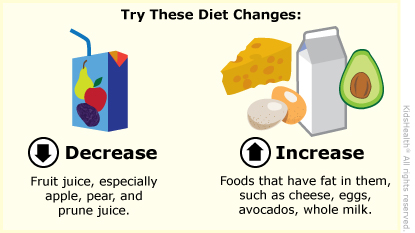Toddler's Diarrhea: How to Care for Your Child
Toddler's diarrhea is when a young child has loose, watery poop at least 4 times a day for 4 weeks in a row. It's called "toddler's diarrhea" because it happens in kids who are 6 months to 5 years old. A child with toddler's diarrhea continues to eat, grow, and gain weight normally. The diarrhea doesn’t make a child less active or less energetic.
Kids with toddler's diarrhea may have loose poop all the time. Or they may have poops that are harder in the morning but that get looser throughout the day. The poop may have small pieces of food in it.
Most kids outgrow toddler's diarrhea. Making changes in your child's diet may help it go away faster.


Treatment for toddler's diarrhea may include changing your child's diet. The health care provider may recommend:
-
Decreasing sweetened drinks, especially those that contain sugar, sorbitol, fructose, or high-fructose corn syrup. Apple, prune, and pear juices are examples of juices that contain sorbitol and should be avoided.
-
Increasing fat. For example, if your child drinks low-fat or nonfat milk, switch to whole milk.
-
Increasing fiber slowly (over a few weeks). Adding too much fiber too quickly can cause bloating, gas, and/or cramps.
-
For kids younger than 4 years old, try puréed fruits, small pieces of cooked fruits and vegetables, and baby cereals (such as bran or oatmeal).
-
Do not give kids younger than 4 years old hard, raw fruits or vegetables, or other foods that can cause choking.
-
For kids older than 4 years old, try raw fruits and vegetables (leave the skin on when possible), dried fruit, nuts, and whole-grain breads and cereals.
Keep track of what your child eats and drinks to find out what helps the poop become more firm. Include:
Do not give any medicines unless the health care provider recommended them. This includes medicines you can buy at the store without a prescription.

Your child:
-
has worsening diarrhea
-
has blood or mucus in the poop
-
has belly pain or vomiting
-
does not want to eat as much as usual or loses weight

Your child:
-
has severe belly pain
-
appears dehydrated; signs include dizziness, drowsiness, a dry or sticky mouth, sunken eyes, crying with few or no tears, or peeing less often (or having fewer wet diapers)

Why do some kids get toddler's diarrhea? The cause of toddler's diarrhea is not known. It is common in young kids. It may happen when food moves through a child's intestines too quickly. When this happens, fluid in the food isn't fully absorbed into the body. The extra fluid stays in the intestines, leading to loose, watery poops.
It also may happen when toddlers drink too much fruit juice, sports drinks, and other sweetened drinks. Sometimes it begins after a child has an infection. For some kids, a low-fat or low-fiber diet may be the cause.